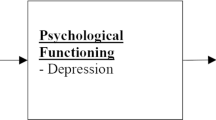Abstract
One hundred fifty-nine adults in a cardiac rehabilitation clinic participated in a study investigating the association of attachment styles with depressive symptomatology. We assessed attachment style using the Reciprocal Attachment Questionnaire and assessed depressive symptomatology using the Symptom Checklist-90-R. Depressed cardiac rehabilitation participants of both genders reported an anxious style of attachment, characterized by intense care seeking in relation to their attachment figures and generalized anger toward their attachment figures. The findings extend previous reports, which indicate that the quality of the marital relationship is a critical variable in determining cardiac rehabilitation patients' adjustments and suggest that assessment of attachment styles can enhance specificity of description in this area.
Similar content being viewed by others
References
Ainsworth, M. D. S. (1985). Attachment across the life span.Bull. N.Y. Acad. Med., 61: 792–811.
Bowlby, J. (1973).Separation: Anxiety and Anger, Basic Books, New York.
Bowlby, J. (1980).Attachment and Loss; Loss, Sadness and Depression. Basic Books, New York.
Case, R. B., Moss, A. J. Case, N., McDermott, M., and Eberly, S. (1992). Living alone after myocardial infarction: Impact on prognosis.JAMA 267: 515–519.
Clark, A., and Friedman, M. J. (1983). Nine standardized scales for evaluating treatment outcomes in a mental health clinic.J. Clin. Psychol. 39: 939–950.
Coyne, J. C., and Smith, D. A. F. (1991). Couples coping with myocardial infarction: A contextual perspective on wives' distress.J. Person. Soc. Psychol. 61: 404–412.
Derogatis, L. R. (1983).The SCL-90-R: Administration, Scoring and Procedures, Clinical Psychometric Research, Baltimore.
Derogatis, L. R., Rikels, K., and Rock, A. (1976). The SCL-90 and the MMPI: A step in the validation of a new self-report scale.Br. J. Psychiatry 128: 280–289.
Edwards, D. W. (1978). Test taking and the stability of the adjustment scales: Can we assess patient deterioration?Eval. Q. 2: 275–291.
Fielding, R. (1991). Depression and acute myocardial infarction: A review and reinterpretation.J. Soc. Sci. Med. 32: 1017–1027.
Frasure-Smith, N., Lesperance, F., and Talajic, M. (1993). Depression following myocardial infarction: Impact on 6-month survival.JAMA 270: 1819–1825.
Henderson, S. (1977). The social network, support and neurosis: The function of attachment in adult life.Br. J. Psychiatry, 131: 185–191.
Melamed, B. G., and Brenner, G. F. (1990). Social support and chronic medical stress; An interactional-based approach.J. Soc. Clin. Psychol. 9: 104–117.
Ruberman, W., Weinblatt, E., Goldberg, J. D., and Chaudry, B. S. (1984). Psychosocial influences on mortality after myocardial infarction.N. Engl. J. Med. 311: 552–559.
Schleifer, S. J., Macari-Hinson, M. M., Coyle, D. A., Slater, W. R., Kohn, M., Gorlin, R., and Zucker, H. D. (1989). The nature and course of depression following myocardial infarction.Arch. Intern. Med. 149: 1785–1789.
Sroufe, L. A. (1986). Bowlby's contribution to psychoanalytic theory and developmental psychology.J. Child Psychol. Psychiatry 27: 841–849.
Waltz, M. (1986). Marital context and post-infarction quality of life: Is it social support or something else?Soc. Sci. Med. 22: 791–805.
West, M., and Sheldon-Keller, A. (1992). The assessment of dimensions relevant to adult reciprocal attachmentCan. J. Psychiatry, 37: 600–606.
West, M., and Sheldon-Keller, A. (1994).Patterns of Relating: An Adult Attachment Perspective. Guilford, New York.
West, M., Sheldon, A., and Reiffer, L. (1987). An approach to the delineation of adult attachment: Scale development and reliability.J. Nerv. Ment. Dis. 175: 738–741.
West, M., Rose, M.S., and Sheldon-Keller, A. (1994). Assessment of patterns of insecure attachment in adults and application to dependent and schizoid personality disorders.J. Person. Disord. 8: 249–256.
Wetzler, S., Kahn, R., Strauman, T. J., and Dubro, A. (1989). Diagnosis of major depression by self-report.J. Person. Assess. 53: 22–30.
Williams, R. B., Barefoot, T. C., Califf, R. M., Haney, T. L., Saunders, W. B., Pryor, D. B., Hlatky, M. A., Siegler, I. C., and Mark, D. B. (1992). Prognostic importance of social and economic resources among medically treated patients with angiographically documented coronary artery disease.JAMA 267: 520–524.
Author information
Authors and Affiliations
Rights and permissions
About this article
Cite this article
Rose, M.S., West, M. Attachment problems and depressive symptomatology in cardiac rehabilitation patients. Int J Rehab Health 2, 113–124 (1996). https://doi.org/10.1007/BF02213446
Issue Date:
DOI: https://doi.org/10.1007/BF02213446




